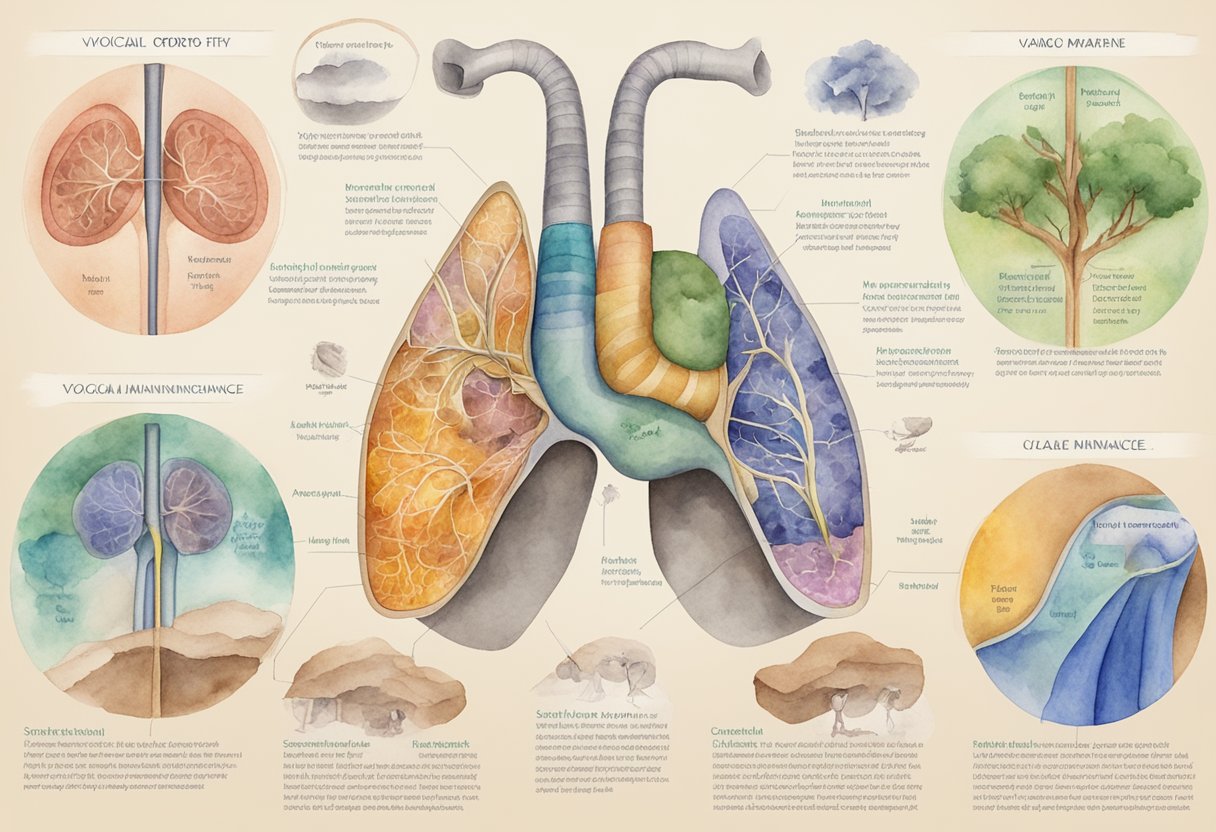Beginner’s Guide to Singing as a Hobby: Cultivating Your Vocal Talents
Singing is a hobby that bridges the gap between the joy of music and the self-expression found in every note. You, like so many others, might find that singing provides a creative outlet that’s both personal and exhilarating.
Whether you’re in the shower, in the car, or on a stage, the act of singing is an accessible and rewarding pursuit. It’s a way to unwind, express emotions, and even improve your overall well-being.

Starting your journey into singing can be as simple as taking that first brave step of vocalizing melodies. You don’t need fancy equipment or an audience—just a willingness to explore your voice.
As you progress, you may consider structured practices like vocal exercises, joining a choir, or even professional lessons. These can all work wonders in enhancing your skills.
One of the beauties of choosing singing as your hobby is that it can be adapted to fit your lifestyle and preferences. Whether you’re initially shy and prefer singing alone or you’re eager to share your voice with others, there’s a comfortable pace for everyone.
Remember, every singer started somewhere, and by embracing singing as your hobby, you’re joining a timeless tradition that celebrates the unique power of the human voice.
Exploring the Fundamentals of Singing

When you embark on learning to sing, it’s essential to build a strong foundation. First, recognize that singing is both an art and a skill that involves your voice and your understanding of music.
Breath Control:
Breathing is the cornerstone of singing. With the right technique, you can control your voice more effectively.
The goal is to breathe deeply using your diaphragm and manage your breath output as you sing.
Vocal Range:
Identify your vocal range, the spectrum of notes that you can sing comfortably. This will help you choose songs and genres that fit your voice.
Posture:
Your posture directly impacts your ability to produce sound. Stand straight with shoulders relaxed but not slouched.
Vocal Health:
Maintain your vocal health by staying hydrated and avoiding strain. Practice regularly but also allow your voice to rest.
Articulation:
Clarity in singing comes from proper articulation. Work on pronouncing vowels and consonants clearly.
Learning the Terms:
Familiarize yourself with musical terms used in singing to better understand the instructions and feedback.
Mastering Basic Vocal Techniques

Developing your singing ability begins with mastering basic vocal techniques. This foundation is critical for ensuring vocal health and improving your vocal tone.
Breathing and Posture
Breathing technique is fundamental to singing. Proper breathing starts with good posture; stand straight with feet shoulder-width apart and shoulders relaxed.
Breathe deeply using your diaphragm, not your chest, to draw in air.
Practicing diaphragmatic breathing supports sustained notes and helps maintain vocal stamina.
- Exercises for Breathing and Posture:
Warm-Up and Vocal Exercises
Never underestimate the importance of a good warm-up. Like any physical activity, your voice needs to stretch before performance.
Begin with gentle hums and progress to vocal exercises that cover various scales.
This not only improves vocal range but also flexibility and control.
- Basic Warm-Up Routine:
Understanding Vocal Range and Registers
Knowing your vocal range and the different registers—chest voice, head voice, and falsetto—is crucial.
Identifying where your voice sits comfortably allows you to choose songs within your range and work on expanding it.
- Identifying Your Range:
Controlling Pitch and Tone
Pitch and vocal tone require consistent work for precision and clarity. Staying in tune is essential for a polished performance.
Practice singing with a keyboard or use a tuning app to help distinguish pitch accuracy.
Sing with clear diction and open vowels to maintain a beautiful tone.
- Techniques for Pitch and Tone Control:
Building a Practice Routine

A structured singing practice routine is the foundation for improving your vocal skills and building confidence.
By integrating daily exercises, setting achievable goals, utilizing digital tools, and ensuring rest for vocal recovery, you can create a sustainable and effective practice schedule.
Incorporating Daily Exercises
Start your daily practice with a series of warm-up exercises to prepare your voice.
These should include humming, lip trills, and sirens to gently activate your vocal cords.
Following these warm-ups, engage in specific breathing exercises to support your vocal work.
For example, practice inhaling deeply and controlling your exhale to develop steady breath control — a crucial aspect of singing.
- Daily Warm-Up Routine:
Setting Realistic Goals
Your singing goals should be clear and achievable. Break down your long-term aspirations into shorter, manageable objectives.
For example, focus on mastering a particular song within a week or improving your pitch accuracy.
Setting these goals gives you a sense of direction and helps measure your progress.
Rest and Vocal Recovery
While practice is crucial, so is rest. Your vocal cords are delicate and need time to recover to maintain good vocal health.
Ensure you drink plenty of water and rest your voice when needed, especially after intensive training sessions or performances.
Health and Maintenance of Vocal Cords

Maintaining vocal health is crucial, especially if you have taken up singing as a hobby.
Your vocal cords are delicate and require proper care to function at their best.
Here are some essential steps to avoid strain and maintain vocal cord health:
- Rest: Ensure you give your voice plenty of rest, especially after extensive use. Your vocal cords are like any other muscle in your body and can become fatigued. Allow time for recovery to prevent damage.
- Hydration: Drink enough water to keep the vocal cords hydrated. Aim for at least 8 glasses of water a day to maintain moisture and improve the flexibility of your vocal cords.
- Warm-Up and Cool-Down: Implement a routine that includes:
- Physical stretches to release tension in the neck and shoulders.
- Breathing exercises for better breath control.
- Vocalises to gently prepare your voice for singing.
- Technique: Invest time in learning proper singing techniques to minimize vocal strain. Correct breathing, posture, and articulation all contribute to vocal health.
- Lifestyle: Monitor your environment and lifestyle choices. Avoid irritants such as smoke and excessively dry air and reduce shouting or speaking in loud environments.
- Professional Care: If you experience persistent vocal issues or strain, seek advice from a professional such as a singing teacher or speech therapist. Regular check-ups with an otolaryngologist (ENT) can also ensure that your vocal cords remain healthy.
Developing Performance Skills

When you step onto the stage, your voice is just one aspect of a dynamic performance.
Effective performance skills such as presence, confidence, and microphone handling are essential for transforming a song into a memorable live experience.
Stage Presence and Confidence
Your stage presence can captivate the audience even before you sing a note.
Practice maintaining eye contact with your audience to build a connection and convey emotion.
Use open body language to project confidence.
The way you move on stage can express the feel of the song—let your expressions and gestures resonate with the performance.
Always remember, your presence is as much a part of the act as your voice.
Microphone Techniques
Proper microphone technique is crucial for clear audio and clarity of voice.
Hold the microphone at the correct distance—typically a thumb’s width away from your chin—to ensure your voice is neither too loud nor too soft.
Be aware of how to angle the microphone to avoid unwanted breath sounds and control voice projection.
Efficient use of the microphone can also help convey the subtleties in your expression, enhancing the emotional impact of your performance.
Expanding Your Singing Capabilities

Engaging in singing as a hobby is an exciting adventure that allows you to express yourself artistically.
To truly enjoy this journey, it’s important to focus on techniques that can enhance the quality and range of your singing voice.
Learning Advanced Vocal Techniques
Breathing Technique:
Proper breath control is crucial for singing. A reliable technique involves practicing diaphragmatic breathing, which allows you to maintain steady breath support during extended singing sessions.
This can greatly improve your vocal stamina and help you sing longer phrases with ease.
- Scale Mastery:
Scales form the foundation of your vocal range and are vital in achieving pitch accuracy.
Regularly practicing scales can expand your range and contribute to your overall singing capabilities.
Vocal Technique and Style:
- Consistency: Practice regularly to develop a consistent style and vocal quality.
- Exploration: Experiment with different genres to find the style that best suits your voice.
- Imitation: Listen to skilled singers and try to replicate their techniques to learn nuances of their style.
Harmony and Resonance:
- Individual Practice: Spend time on solo exercises that fine-tune your sense of pitch and enhance your ability to sing in harmony.
- Group Singing: Join a choir or singing group to practice harmonizing with others and to experience how your voice blends and resonates within a collective.
Expanding Your Repertoire:
- Challenging Material: Choose songs that push your current limits, but are still achievable with practice.
- Versatility: Incorporate a variety of songs from different genres and time periods to become a more versatile singer.
Choosing the Right Repertoire

When you start singing, selecting the right repertoire is crucial for an enjoyable and successful performance.
A repertoire consists of all the songs you are prepared to sing and should showcase your strengths as a singer.
- Vocal Register:
Choose songs that fit comfortably within your vocal range—the notes from the lowest to the highest that you can sing.
Singing within your range helps to ensure vocal health and better quality sound.
- Expand Gradually:
While comfort is key, occasionally pushing your range gently can aid in expanding it. Here’s a guide to selecting songs for beginning singers.
Consider the genre of music that resonates with you.
Are you drawn to energetic pop, soulful R&B, or maybe intricate classical pieces?
Each genre requires different vocal techniques and can highlight various aspects of your ability.
- Know Your Style: Reflect on what kind of music inspires you. If you prefer storytelling, folk or country genres might be a good match. For showcasing technical skills, you might lean towards classical or jazz.
- Seek Advice:
If you’re unsure, consulting with a vocal coach can provide valuable insight. A coach can also help you find songs suited to your current skill level.
Performance:
- Exploring the right song selection is critical for any performance context and connecting with your audience.
Connecting with the Audience

When engaging in singing as a hobby, your ability to form an emotional connection with your audience is paramount.
To ensure a performance resonates, pay attention to these key aspects:
- Emotion:
Embody the emotions of the song you’re singing. Audiences connect more deeply when they can feel what you’re feeling.
- Expression:
Use your face and body to communicate the song’s message. A well-placed gesture can accentuate the drama or mood of a piece.
Remember, the difference between a good performance and a great one often lies in the details, including how well you:
| Aspect | Why It Matters |
|---|---|
| Eye Contact | Establishes a personal connection with individual listeners. |
| Expression | Amplifies the emotional impact of your performance. |
| Movement | Enhances the overall expression of the song. |
- Confidence:
Believe in yourself and your ability to deliver a compelling rendition. Confidence can carry you through even when you encounter unexpected challenges on stage.
To hold your audience’s attention, consider these tips:
- Rehearse:
Know your material inside out to maintain focus on engaging with your audience rather than recalling lyrics or melodies.
- Relax:
Take deep breaths and relax your body to help convey ease and confidence.
- Connect with the Lyrics:
Personalize the song so that it reflects something true about your own life experiences, offering authenticity to the listener.
Recording and Evaluating Your Voice

When you embark on singing as a hobby, recording and periodic evaluation of your voice are essential steps in developing your skill and performance.
Through recording, you gain a tangible reference to monitor your progress and identify areas for improvement.
Evaluating your recordings helps to build confidence as you hear your voice evolve over time.
Effective Use of Feedback
Recording Your Singing:
It’s pivotal for you to regularly record your singing sessions. Use a quality recording device or app that can capture the nuances of your voice.
This creates a personal archive that serves as a baseline for tracking your vocal development.
Once recorded, listen back to analyze the following elements:
- Pitch: How accurately are you hitting the notes?
- Tone: Is your voice producing the desired sound?
- Dynamics: Can you hear the variations in volume and expression?
Seeking Feedback:
Beyond self-assessment, obtaining constructive feedback from peers or vocal coaches can significantly accelerate your learning curve.
Feedback provides objective input on your vocal technique and performance aspects that you may not recognize on your own.
Remember, feedback should be:
- Specific: Ensure that the feedback addresses particular aspects of your singing, whether it’s pitch accuracy or emotional expression.
- Actionable: Good feedback offers clear suggestions for how to improve, giving you a direct path to take in your practice sessions.
Healthy Habits for Singers

As a singer, your vocal health and overall well-being play a crucial role in your performance.
Maintaining a proper diet and hydration are essential for keeping your voice in top condition, just as managing stress and anxiety is necessary for delivering your best performances consistently.
Diet and Hydration
Your diet has a significant impact on your vocal cords.
Include foods that are rich in vitamins and minerals to help maintain mucous membrane health, crucial for your vocal health. Here are some dietary tips for singers:
- Hydration:
Aim to drink at least 8 glasses of water daily to keep your vocal cords hydrated and avoid dryness, which can lead to strain and injury.
- Foods to Include:
- Leafy greens for their vitamin content.
- Fresh fruits for hydration and vitamins.
- Whole grains for sustained energy.
- Foods to Avoid:
- Dairy, which can cause phlegm buildup.
- Spicy foods, which can cause acid reflux.
Managing Stress and Anxiety
Stress and anxiety can affect your breath support and vocal quality.
To manage these:
- Regular Rest: Ensure you get adequate sleep each night to allow your body and voice to recover.
- Breathing Exercises: Practice deep breathing techniques to improve your breath support and help alleviate stress.
By incorporating these healthy habits into your life, you’re not just taking care of your voice, but you’re also enhancing your overall health.
Pursuing Singing as More than Just a Hobby

If you’ve nurtured a passion for singing and find yourself yearning to transition from casual singing to a more professional level, there are several steps you can take to tread this promising path.
The journey from a hobbyist to a professional artist involves dedication and strategic planning.
Firstly, evaluate your skills critically and seek feedback.
- Be honest about your vocal ability.
- Reach out for constructive criticism from more experienced singers.
Embarking on a singing career requires continuous learning and improvement.
To advance your skills, consider investing in vocal training with a reputable coach. Listing benefits such as improved control and technique sets clear expectations.
- Vocal coaches can guide you on proper technique and breath control.
- Training often includes scales, vocal exercises, and performance prep.
Building a portfolio is essential.
Start with smaller gigs, maybe at local venues or community events, to gain performing experience.
- Record your performances for self-assessment and to show potential booking agents or producers.
- Use these recordings to create an artist profile, showcasing your talent.
Networking is key in the music industry; attend industry events, connect with other musicians, and maintain an active social media presence.
- Engage with local music communities.
- Utilize platforms like Reddit’s singing subreddit for insights and advice.
Remember, adopting a professional mindset towards singing means treating it not just as a passion, but as a business. Setting clear goals and being persistent can pave the way to a successful singing career.
Frequently Asked Questions

Embarking on your journey as a beginner in singing involves learning various techniques, understanding self-teaching methods, practicing vocal exercises, adhering to a practice schedule, performing proper vocal warm-ups, and tracking your progress.
What are the essential techniques every beginner singer should practice?
To lay a solid foundation, you should focus on key techniques such as breath control, pitch accuracy, and articulation. These are crucial for enhancing your voice quality and developing your singing skills.
Can I teach myself to sing, and what resources are most helpful for self-taught singers?
Yes, you can teach yourself to sing.
Resources like online tutorials, singing apps, and instructional books are vital for self-taught singers. A comprehensive beginner’s guide to vocal mastery can be a great starting point.
What exercises can help improve my singing voice as a beginner?
Engaging in vocal exercises such as scales, lip trills, and humming helps to strengthen your vocal cords, improve your range, and enhance vocal endurance. These exercises are the building blocks for a stronger singing voice.
How often should a beginner practice singing to see progress?
Consistency is key when learning to sing.
Practicing daily for at least 30 minutes can yield noticeable progress. Remember, regular practice over time is more effective than infrequent, extended practice sessions.
Which vocal warm-ups are recommended for someone just starting their singing hobby?
Begin with gentle vocal warm-ups like humming, lip rolls, and light scales to safely prepare your voice.
Start in a comfortable pitch range and gradually extend as your voice warms up. This helps prevent vocal strain.
In what ways can I track my singing progress as a beginner at home?
Track your singing progress by recording yourself regularly. Then, listen back and note improvements. Also, set achievable goals.
Utilize feedback from trusted listeners. Additionally, compare your performances over time to monitor your development.

